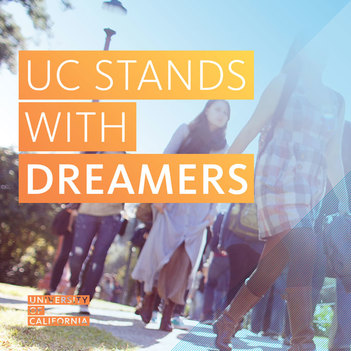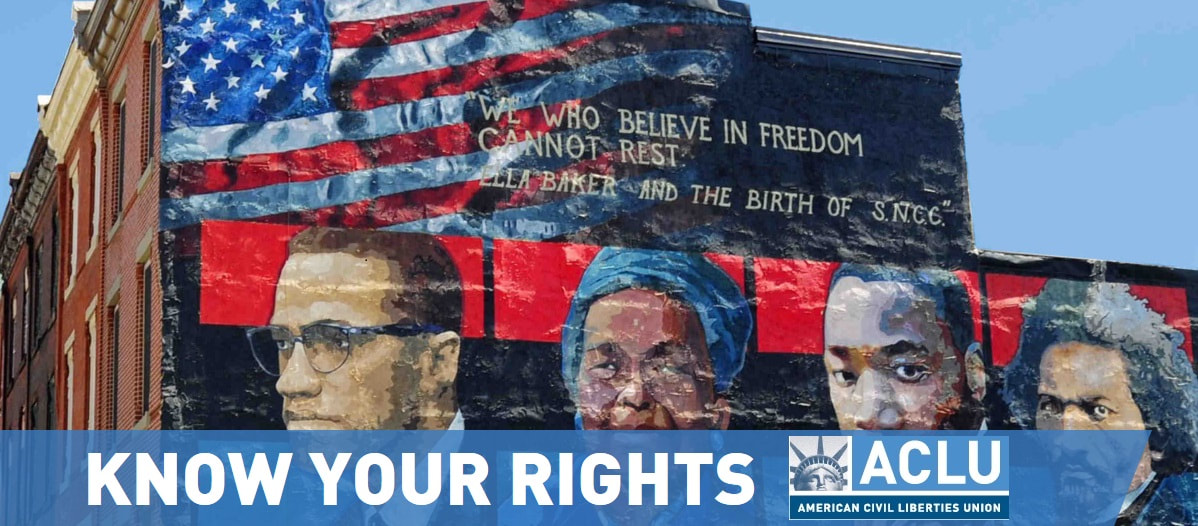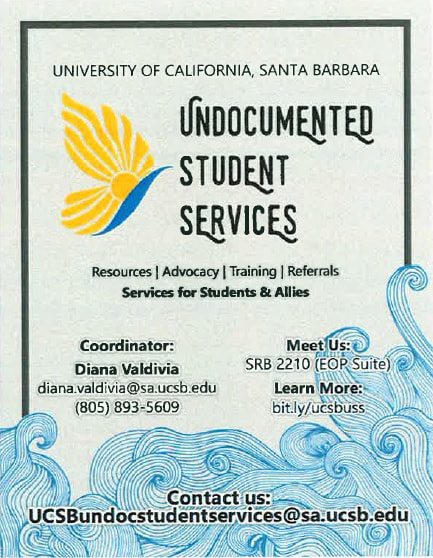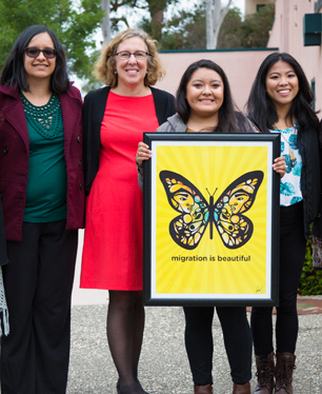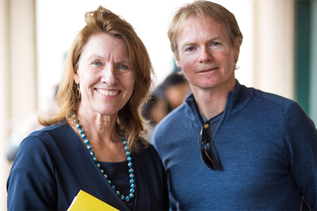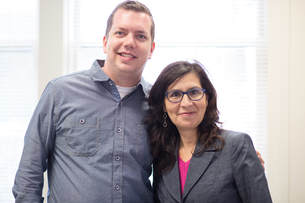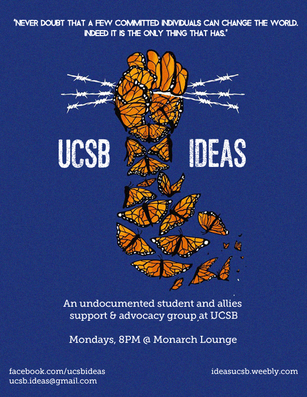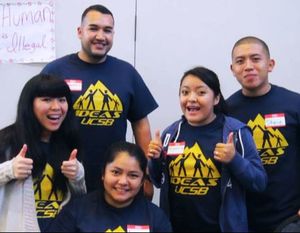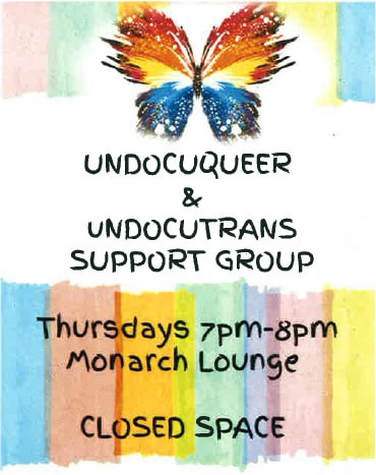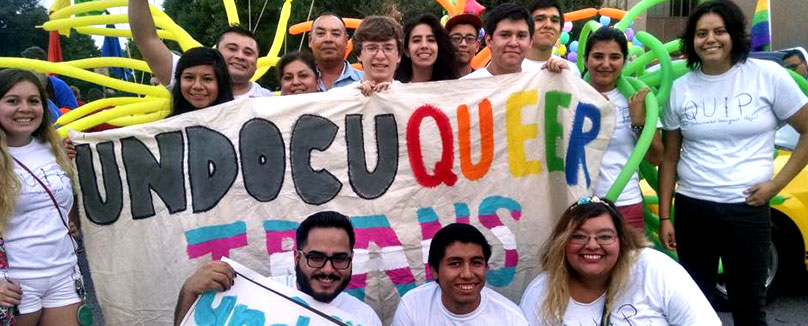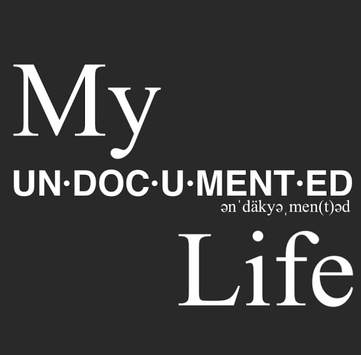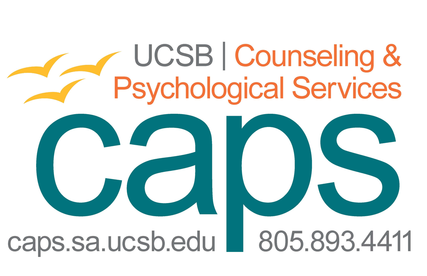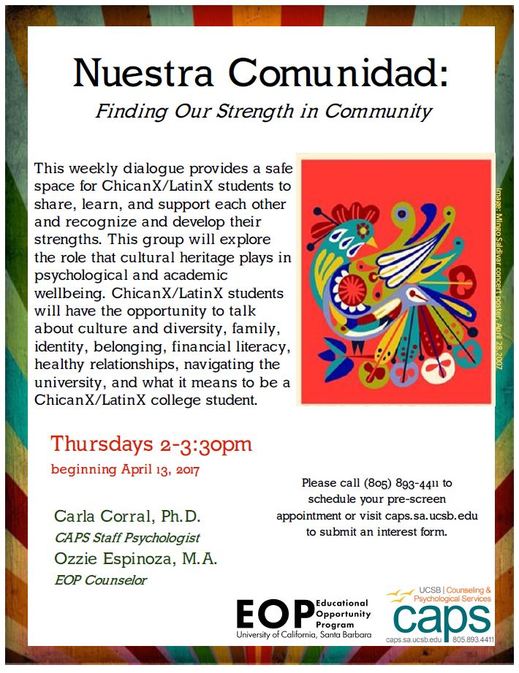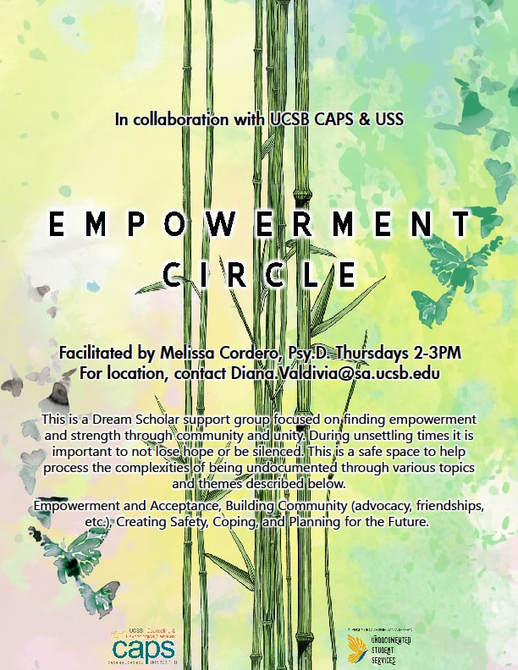|
University of California, Santa Barbara is proud to be a dedicated supporter of all immigrants who come to our university to work towards a better future.
The current political climate and policy changes towards immigrants have increased fear and anxiety in many of our students and their families. Recently the current administration has specifically targeted undocumented students with the repeal of the Deferred Action for Childhood Arrivals (DACA) program. These latest developments have threatened the futures that our students have been working towards and have further put the integrity of their families and their communities in jeopardy. Read the statements below from UC President Janet Napolitano and UCSB Chancellor Henry T. Yang that reaffirm UC's unwavering support for Dream Scholars, undocumented students and their families. |
Common Reactions to Current US Immigration Policies/Events
In light of the new administration’s executive orders and the repeal of DACA many students are experiencing fears about deportation not only for themselves but also for their loved ones and other members of their community. But many of these concerns are not new to undocumented students. In fact, they have lived with threats of deportation, racial discrimination and harassment, and other conflict because of their identity for some time and have learned how to survive and thrive despite these injustices.
To survive and thrive amidst these pressures, students need to be able to recognize the common signs and signals of distress, pay attention to these signals (not ignore them!), and actively employ strategies to reduce their distress. Further, making regular time for self-care and reaching out to support and care for one another will build a strong foundation of resilience.
To survive and thrive amidst these pressures, students need to be able to recognize the common signs and signals of distress, pay attention to these signals (not ignore them!), and actively employ strategies to reduce their distress. Further, making regular time for self-care and reaching out to support and care for one another will build a strong foundation of resilience.
Common symptoms of distress when students have immigration issues & concerns on their mind
|
Acute Stress & Trauma:
|
Importance of Paying Attention to Signals of Distress (“Red Flags”)
|
Most people know the symptoms that tell them they are distressed, but all too often they ignore their symptoms (“I don’t have time to feel bad!) Think of these symptoms as the early warning signs--the “red flags”--that tell you to stop and take a moment to consider how to handle whatever is going on. By attending to these early signs, you may be able to prevent yourself from feeling much worse later.
Chronic stress can lead to devastating longer-term health implications such as heart disease, asthma, diabetes, and post-traumatic stress disorder, it is important to work towards reducing your level of distress. |
What can be done to help relieve your distress?
Relaxation and Mindfulness updated
- Practice good self-care. Put energy into healing and feeding your soul. Taking care of your mind and body will help you to reduce stress and build resilience. Exercising, eating a balanced diet, and getting plenty of rest are essentials, but perhaps you could also consider trying mindfulness exercises and/or yoga, .
- Join circles of support. Finding support from others who experience similar concerns helps students to feel understood, cared for, and a sense of greater safety. Sharing your thoughts and feelings about your experience can provide an important opportunity to redefine your narrative and feel more empowered. Check out groups at the bottom of this page to find community.
- Find ways to get back to your routine of being a student. Your routine can create purpose and structure in your day and can feel stabilizing in an unstable time. Be aware that you might need to let up on the pace a bit...that's ok. Listen to and be patient with yourself.
- Find sources of hope. Look to what inspires you--music, books, people--to help you find your strength and bring you peace each day.
- Tap into your faith/spirituality if this is important to you. Engaging in prayer and connecting to your spiritual beliefs can provide you a sense of higher purpose and help to solidify your resolve in these trying times.
- Turn your energy into activism if you feel safe to. For some students, getting involved in social justice organizations and other advocacy efforts helps them to feel more control and efficacy. Make sure to take time to step away from this when you need to, as it can also feel overwhelming to be immersed in the injustices of the world and it can sometimes feel unsafe to put yourself on the line. Take a break and come back.
Building Resilience
|
Resilience is the capacity to withstand and bounce back from significant stress and/or catastrophe. Humans have great capabilities to adapt and overcome risk and adversity, and rebuild their lives even after difficult circumstances or devastating events.
Being resilient doesn’t mean going through life without experiencing stress and pain. People feel grief, sadness, and a range of other emotions after adversity and loss. The road to resilience lies in working through your emotions about painful events and gathering sources of support to help you navigate that path.
|
Tips to Help Each Other Out
|
Creating A Sense of Safety When the World Feels Unsafe
Safety is the experience of being protected from danger and hurt. Within a safe environment, we can relax and be ourselves because we know that our well-being is secure. We feel free to take manageable risks toward growth and change. But the political climate and recent changes in immigration policies have lead many undocumented students and their families to live in daily fear and uncertainty. They feel targeted and traumatized, and experience discrimination and harassment.
Feeling safe is at the core of healing. Although there is much uncertainty, you can experience moments of safety with a trusted therapist, a close friend/partner, or through sharing your experiences with another person impacted by the political climate and immigration policies. Below are important strategies for feeling establishing a greater sense of safety when the world feels threatening.
Feeling safe is at the core of healing. Although there is much uncertainty, you can experience moments of safety with a trusted therapist, a close friend/partner, or through sharing your experiences with another person impacted by the political climate and immigration policies. Below are important strategies for feeling establishing a greater sense of safety when the world feels threatening.
- FIND ALLIES AND BUILD A COMMUNITY OF SUPPORT. The university community is filled with groups that are here to support you in the many ways you need. From peer groups to faculty and staff support services to help you with academic, financial, health, and safety concerns, we have a community waiting to help. Check out the many services listed at the bottom of this page to find contacts in our community.
- KNOW YOUR RIGHTS & RESOURCES. Feeling safe is also about being prepared. Know your rights and resources to call if you find yourself in a situation that threatens your safety or the safety of others. Check out the section below for important links to these resources.
- ESTABLISH AN EMOTIONAL RITUAL. Establishing an emotional ritual is your opportunity to carve out time in your day, just for you. You might want to play special music, light a candle, surround yourself with safe objects (a stone, a flower, a stuffed animal, a special object given to you by someone you love) or your safety container, or even light some incense. You might want to sit on a special pillow or wear your comfiest pajamas. Your ritual can be complex or basic. It might be enough for you to make yourself a cup of tea before you begin. The important thing about creating a ritual for safety is that it has personal meaning that you can use over and over. It helps assure that you have a few minutes for yourself every day to journal, breathe, or just sit in silence. This is your self-care time.
- FIND A SAFE SPOT TO JOURNAL YOUR THOUGHTS AND FEELINGS. Choosing a special place to work on journaling topics can decrease your chances of being interrupted and boost your feelings of safety. Think about the places where you feel particularly relaxed and the most calm. The important thing is that you seek a spot where you can be the most at ease, the most centered on yourself and the task in front of you.
- FIGURE OUT THINGS YOU CAN CONTROL AND FIND WAYS TO LET GO OF EVERYTHING ELSE. Staying immersed in worry only serves to compromise your health and make you less resilient to challenges that come your way. Find ways to tolerate the uncertainty of things you can't control. Being active and working toward your goals can give you hope. So, work towards staying present and engaged in your daily life activities.
Get Empowered By Being Prepared
The unfortunate reality is that some students and/or their friends, members of their family and their community will experience discrimination due to their status and have potential run-ins with police or immigration officials. The possibility of this can cause anxiety and fear. One way to take some control and feel more empowered is to Know Your Rights and be prepared to know how to respond if something does happen.
Read the resources below from the American Civil Liberties Union (ACLU) and the National Immigration Law Center (NILC) to Know Your Rights and download instructions on what to do to advocate for yourself in difficult situations. Check out the legal resources that UCSB has to offer for you and your family.
Read the resources below from the American Civil Liberties Union (ACLU) and the National Immigration Law Center (NILC) to Know Your Rights and download instructions on what to do to advocate for yourself in difficult situations. Check out the legal resources that UCSB has to offer for you and your family.
Focusing on Personal Goals
Students affected by the uncertainty of these times can experience existential crises ("what's the point of doing anything?!!?), they might wonder if they should keep going to class, finish school, or whether they need to be preparing other plans. Some even wonder how do they will continue going on with life given their current circumstances.
You have goals. You have dreams. Those are yours and others can't take that away from you. Remembering your worth and your purpose can restore your strength and help you to keep moving in the right direction. Check out this article about how other undocumented students find their purpose through focusing on their goals. |
Community of Support
Many undocumented students express that they have difficulty knowing who to trust. Students who registered in good faith through DACA with the promise of support from the federal government feel betrayed by this administration and now they fear that stepping forward to receive this support may come back to hurt them or their families. This distrust and sense of betrayal can lead students to withdraw, be more isolated, and hide the struggles that they're having because of their status.
UCSB has a deep commitment to supporting undocumented students by providing dedicated resources, spaces, and services to meet their needs. Check out the many resources below to access the services that best meet your needs.
UCSB has a deep commitment to supporting undocumented students by providing dedicated resources, spaces, and services to meet their needs. Check out the many resources below to access the services that best meet your needs.
|
UC Santa Barbara is committed to fostering a safe and supportive environment for students of diverse backgrounds including our undocumented students at UCSB and their families. The University strives to develop an awareness and understanding of the experiences of undocumented students while maintaining the confidentiality of individual students.
UCSB's Undocumented Student Services offers general counseling, community programming, a lending library, faculty mentorship, support groups, and a fantastic new lounge for the student community. |
Dream Scholars Resource Team
In these times undocumented students find it difficult to know who to trust. They can feel overwhelmed and they might need extra support around academic, financial, health, and safety concerns, among others.
The Dream Scholars Resource Team is a community of support and mentorship at all levels of the university to address student needs (e.g., academic, financial, health, safety) so that students can not only persist in school and graduate but thrive in the process of reaching these goals. Click here to access the list of allies across the university who are on the Dream Scholars Resource Team and will work with all undocumented students to provide support. |
|
|
Counseling and Psychological Services (CAPS) stands against racism and violence that aims to harm and divide people because of our differences. We would like to express our care and compassion for those who have been directly or vicariously impacted by discrimination, harassment, or other trauma due to immigration policies and social injustice.
All registered UCSB students are eligible for services at CAPS. We provide individual therapy and groups serving undocumented students. All therapists are trained to provide support to undocumented students, but you may request to work with a therapist who focuses on providing support to undocumented student. Give us a call to learn more about we offer.
|
Proudly powered by Weebly

